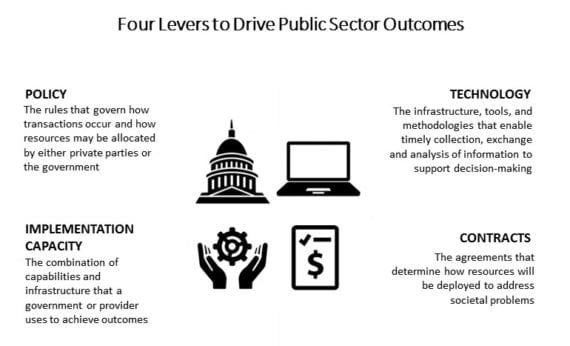The Next Phase of Pay for SuccessDriving Public Sector Outcomes
When we started Third Sector six years ago, my co-founders and I had a fundamental assumption: the increasing availability of data would empower government to allocate its resources to programs that measurably improve lives. We began by testing Pay for Success (PFS) as a contracting tool to catalyze this shift.
Six years and six PFS contracts later, we are proud of our work reallocating over $100M in public sector funding to outcomes-driven programs. But we have also found our central assumption challenged in three ways:
- Public sector data infrastructure is not built to underwrite outcomes contracts. Data remain siloed across agencies for compliance purposes and are difficult to access without intensive agreements. This limits the ability for providers to use data to learn and improve. It also reduces the replicability of PFS projects and the ability of additional governments to harness data to understand, and fund, what works;
- Governments are seeking new appropriations for outcomes payments, versus encouraging improvement for providers within existing funding streams. PFS projects remain bespoke because we have to create new government funding sources for each one, instead of shifting existing funding streams to support providers that improve outcomes;
- Change management support is essential for government and providers. Empowering stakeholders to implement a PFS contract takes more effort than developing the contract itself. We thought we were in the contracting reform and public-private financing business. Yet even after those contracts and economic models were written, we found we spent enormous effort on change management with providers and governments to successfully launch and implement projects. We also discovered that moving government to outcomes does not always require outside financing, but when it does it can be one powerful tool to catalyze transparency and align incentives.
These challenges added up to significant amounts of time and projects with limited replicability. Understanding these challenges has helped Third Sector reflect on our progress and develop our theory of change for the next six years.

We now understand just how intensive it can be to change a process as engrained as government contracting. We also recognize that re-writing government contracts will not necessarily drive social sector outcomes. We now appreciate that contracting reform is just one of four critical levers to drive outcomes, and that all four levers must work together to shift the incentives to better allocate resources in the social sector. The four levers are:
Policy: The rules that govern how transactions occur and how resources may be allocated by either private parties or the government.
Technology: The data infrastructure, front-end software tools, and integration methodologies that enable timely collection, exchange, and analysis of data to support decision-making.
Contracts: The agreements that determine how resources will be deployed to address societal problems.
Implementation Capacity: The combination of capabilities and systems infrastructure that governments and providers use to collect data and measure progress towards achieving outcomes.
To date, Third Sector’s strengths have been in developing outcomes contracts and partnering with communities on how to successfully implement those contracts and embed data driven decision-making. The latter has been both the hardest and most valuable part of our work for state and local governments and service providers across the country. It’s culture change at work. We roll up our sleeves to not only design, but lead implementation of outcomes-driven policy in America.
But after six years, we now know our intensive work on projects will not guarantee systemic change. In the coming years, Third Sector will need to simultaneously and deliberately address the four levers that drive public sector outcomes by:
- Partnering with technologists developing open sourced and integrated data solutions to ensure they are deployed and scaled for outcomes-contracting and continuous learning; and
- Developing tangible examples of outcomes-driven contracting within government, and using those examples to generate demand for performance-enabled funding streams.
We believe these strategies, combined with continued adherence to our values and partnership with the communities we serve, will begin a revolution to meaningfully change how governments fund social services. Third Sector will build upon our work with Pay for Success and catalytic private funding sources as one of our tools. And we will innovate alongside our public sector partners to develop new ways to align government and private sector resources with results.
Join us—in partnership and in spirit, to achieve our mission of accelerating America’s transition to a performance-driven social sector. Our service providers and our public officials need support to understand what is working so they can improve how to deliver results for our communities.
Onwards.
Caroline
